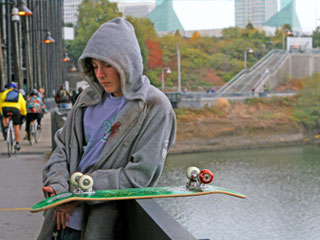Paranoid Park
by George Sax
Skater Dude Dilemma
There’s a scene in Elephant, Gus Van Sant’s 2003 film about two young, male, Columbine High School-style terrorists, that’s not only jarring but obnoxious and irresponsible. One of the youths is shown under a bathroom shower. Unexpectedly, he’s joined by the other boy and then, standing under the showerhead, they kiss. Nothing in the film has prepared us for this scene, and nothing that follows, as the two embark on their murderous and suicidal mission at their high school, explains it.
Watch the trailer for "Paranoid Park"
Elephant never suggests a motive for this spasm of mass violence and we learn nothing significant about the two killers other than this discordant revelation of their apparent mutual attraction. In its pretentiously uninflected coolness, Elephant unavoidably implies that the ensuing massacre is linked to that bathroom kiss. It’s an arbitrary, deeply foolish association.
Van Sant’s latest effort, Paranoid Park, has a shower scene, too, but this time it’s an evocative, arresting one. The camera closes in on young Alex (Gabe Nevins) as he stands, barely moving, and the water runs in rivulets from his head as he closes his eyes. Alex is trying to cleanse himself of any palpable evidence of a horrific incident he’s just experienced, and perhaps to symbolically wash away any taint of guilt.
Paranoid Park is substantially more coherent, emotionally and narratively, than Elephant, probably because it’s grounded in a young adult novel of the same title by Blake Nelson, which it follows in broad outline.
The setting is an unauthorized skate park in Portland, Oregon, built and frequented by lumpen, “outlaw” types. When Alex’s more adventurous high school buddy, Jared, suggests they go there, Alex says he doesn’t think he’s ready for it. Nevertheless, drawn by its underground appeal, he later ventures back on his own, and is inadvertently responsible for a gruesome death. (This depiction is rather grisly.)
Both the book and the film are mostly concerned with Alex’s frightened, faltering attempts to come to some kind of terms with what has happened and to wrestle with his own guilt. His quiet, isolated struggles have both practical and moral implications.

Elephant and Van Sant’s Last Days (2005) have been called the first two parts of a trilogy that the new film completes. The first two often come across as voyeuristically obsessed with the glamour of very young men’s disaffection and dissolution. Paranoid Park sometimes feels similar, but it’s a much more restrained, carefully constructed work. Van Sant overindulges himself in long, slow-motion tracking shots of Alex in school corridors and suburban shopping malls, but these also evoke his alienation and anxiety.
Nevins (who looks a little like a blander version of one of Caravaggio’s street boys) isn’t a professional actor: Much of the young cast was recruited through internet notices and other unconventional means. He’s not much of an actor, but despite a few scenes that play a little awkwardly, his performance works surprisingly well (and he’s on screen virtually all the time).
The book’s protagonist is more articulate and emotionally expressive, but that’s partly a product of the author’s voice. Like the novel’s straitened hero, Van Sant’s Alex is left at the end in an at least temporarily more stable limbo, but his fate, even more than his literary predecessor’s, is still disturbingly up in the air. There is no real moral and practical resolution.
Van Sant’s film does achieve a kind of aesthetic resolution. It sometimes suffers from an overripe visual lyricism and tendency to a narcissistic posture of bleakness, but it’s also more emotionally resonant and incisive than much of his previous work. The material seems to have inspired him to contemplate the possibility of tragedy overtaking an ordinary young life, and a struggle to escape from it.
blog comments powered by Disqus
|
Issue Navigation> Issue Index > v7n17: Fistful of Dollars (4/24/08) > Film Reviews > Paranoid Park This Week's Issue • Artvoice Daily • Artvoice TV • Events Calendar • Classifieds |









 Current Issue
Current Issue